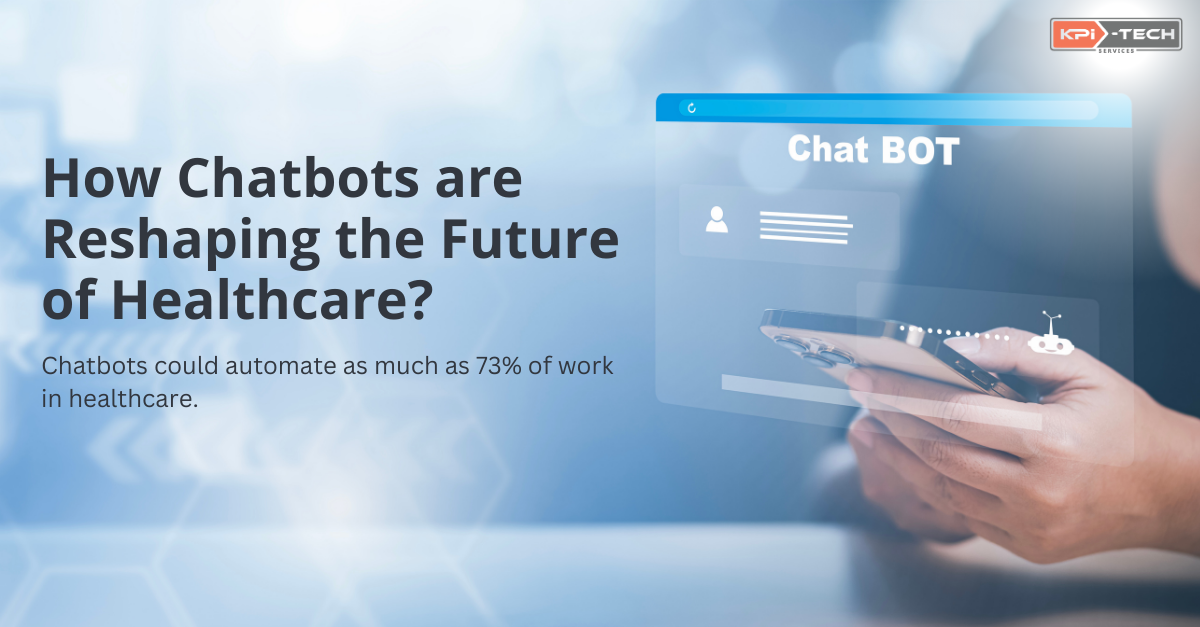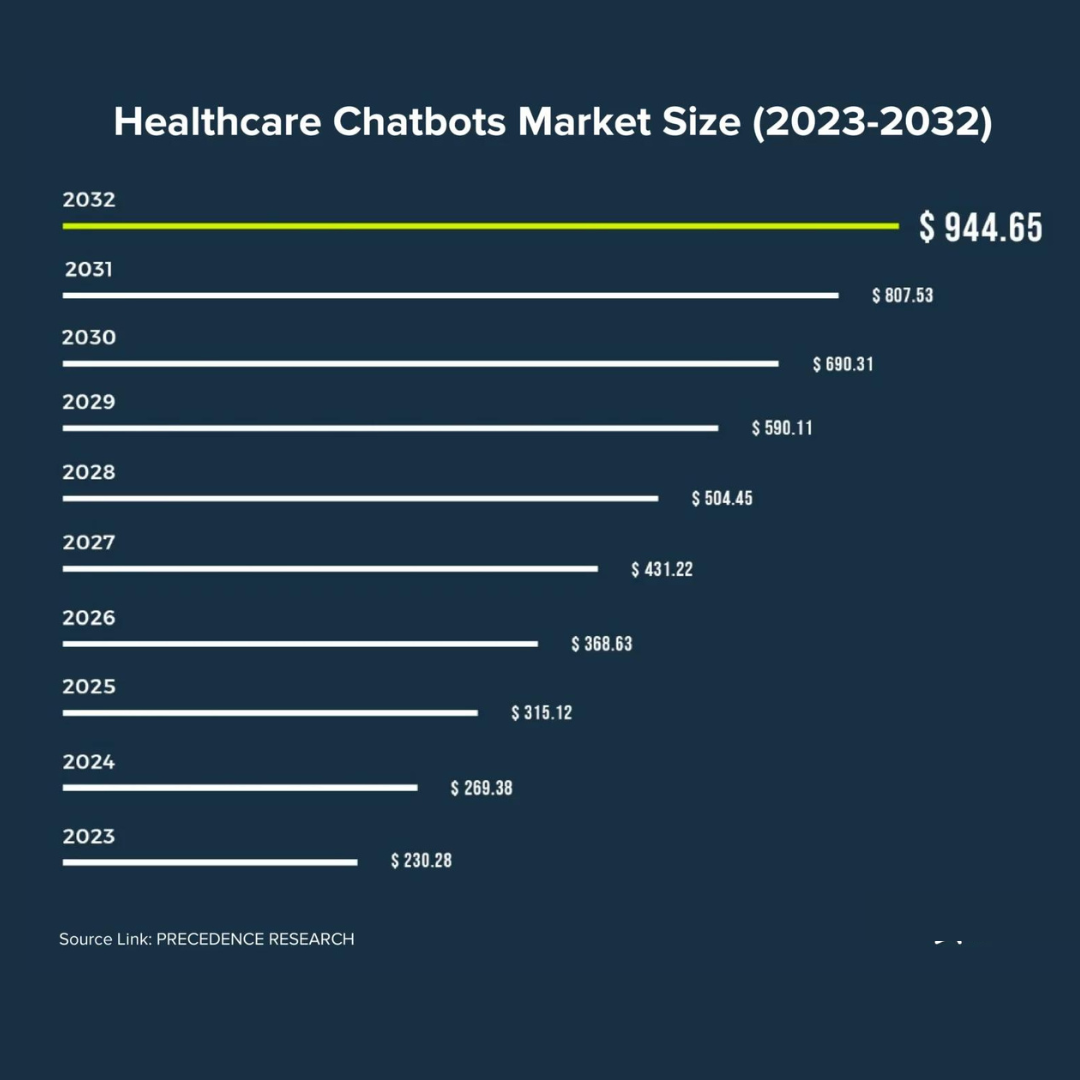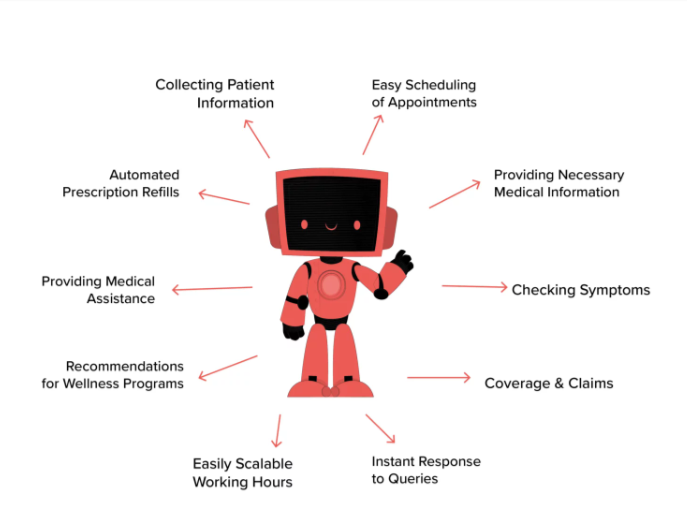
How Chatbots are Reshaping the Future of Healthcare?
In an age where technology is rapidly reshaping various industries, healthcare is experiencing a significant transformation. Healthcare professionals are leveraging Artificial Intelligence (AI) to provide continuous assistance to patients. One notable innovation in this field is the emergence of chatbots, which are revolutionizing patient care and accessibility. This article delves into the profound impact of chatbots in healthcare, ranging from improving patient engagement to streamlining administrative tasks.
As businesses across sectors increasingly recognize the advantages of leveraging chatbots to automate processes, their adoption is expected to continue growing. Projections indicate that the healthcare chatbot market will expand from $230.28 million in 2023 to an estimated $944.65 million by 2032. Let's explore further the advantages and applications of chatbots in the healthcare sector.

Imagine if you could provide your patients with their very own personalized healthcare chatbot, available to assist them wherever and whenever they need it.
Need to schedule reminders for their upcoming doctor's appointments?
Require a way to submit important documents without the hassle of traveling to the hospital?
Many companies have decided to use AI in their teams to stay afloat. This included chatbots. For example, chatbots could automate as much as 73% of work in healthcare, according to Zendesk.
- 35% of individuals utilize chatbots to address complaints or acquire detailed information, as reported by Backlinko.
- Additionally, 74% of internet users prefer engaging with chatbots for straightforward inquiries, according to PSFK.
- HubSpot research indicates that 40% of web users are neutral regarding whether they are served by bots or human agents, as long as they receive necessary customer support services.
- According to The Chatbot, 64% of consumers appreciate the most helpful feature of a chatbot to be its 24/7 availability.
- Lastly, Business Insidernotes that 48% of individuals prioritize a chatbot's ability to resolve issues over its personality.
Healthcare chatbots make these possibilities achievable by serving as AI-powered digital assistants. This technology transforms the patient experience by addressing their needs promptly and efficiently.
What is a Healthcare Chatbot, and What does it do?
Healthcare Chatbots are AI-driven applications that utilize machine learning algorithms or computer programs to interact with individuals through auditory or textual channels. This instant engagement is available 24/7, enhancing communication efficiency within the healthcare ecosystem.
Integrating chatbots into the healthcare industry facilitates seamless communication between patients and healthcare professionals, reduces unnecessary expenses, and establishes a continuous, accessible support system.
These chatbots aren't just beneficial for patients; they also greatly aid healthcare providers. By automating responses to repetitive patient inquiries and handling basic tasks like appointment scheduling or providing health information, healthcare professionals can save time and connect with more patients effectivel
Different Types of Chatbots
There are several types of chatbots, each designed to serve different purposes and functionalities. Here are some common types:
- Rule-based Chatbots: These chatbots operate based on predefined rules and responses. They follow a decision tree structure, providing predetermined answers to specific user inputs.
- AI-powered Chatbots: These chatbots utilize artificial intelligence and natural language processing (NLP) to understand and respond to user inputs more dynamically. They can learn from interactions and adapt their responses over time, providing a more personalized user experience.
- Virtual Assistants: Virtual assistants are advanced AI-powered chatbots designed to assist users with a wide range of tasks, including scheduling appointments, providing information, and performing various functions through integrations with other applications and services.
- Transactional Chatbots: These chatbots are specifically designed to handle transactions, such as processing orders, making reservations, or conducting financial transactions, often integrating with payment gateways or other backend systems.
- Hybrid Chatbots: Hybrid chatbots combine elements of rule-based and AI-powered chatbots, allowing them to provide both predefined responses and dynamically generated answers based on user inputs and context.
- Voice-enabled Chatbots: These chatbots interact with users through voice commands and responses, leveraging technologies such as speech recognition and natural language understanding to provide hands-free interaction.
RELATED: Practical How is AI Helping in the Healthcare Industry: Areas of Application
Use Cases In Healthcare

-
Easy Appointment Scheduling
Appointment scheduling in the healthcare sector can often be a source of frustration for patients due to slow systems and complicated procedures, leading to potential appointment cancellations or patients seeking alternatives. However, chatbots present a solution to this issue by offering a smooth scheduling experience. Through a messaging interface on websites or apps, patients can efficiently book appointments based on doctor availability. Moreover, chatbots can integrate with CRM systems to assist medical staff in managing patient visits and follow-up appointments effectively, ensuring easy access to relevant data for future use. Additionally, AI-driven healthcare chatbots can simplify the payment process by collecting and processing co-payments, further streamlining appointment scheduling.
-
Providing Medical Information
Healthcare chatbots undergo training using comprehensive datasets that encompass a wide range of information concerning disease symptoms, diagnoses, and treatments. This training equips chatbots with the ability to comprehend user inquiries and furnish pertinent information guided by predefined labels within the training data. Leveraging this capability, users can swiftly access precise medical information, thereby saving time and simplifying the process. With minimal input, users can receive highly accurate diagnoses from these chatbots, often obviating the necessity for a visit to a clinic or doctor in numerous instances.
-
Symptom Evaluation
Chatbots are becoming more prevalent in assessing patient symptoms and diagnosing medical conditions without requiring a visit to the hospital. NLP-driven chatbots are particularly adept at understanding patient inputs regardless of their form, ensuring precise symptom evaluation. Through analysis of the information provided, these chatbots assist patients in identifying the underlying illness causing their symptoms and determining the necessary level of treatment or medication. This interactive method empowers patients to make informed healthcare decisions based on the insights provided by the chatbot.
-
Coverage and Claims Assistance
Healthcare chatbots can assist patients with insurance-related tasks such as verifying coverage, filing claims, or tracking claim status. By providing easy access to relevant information, chatbots streamline the insurance process for patients and healthcare providers alike. Additionally, chatbots facilitate communication between patients and healthcare authorities, enabling quick authorization of billing payments and addressing any queries or concerns related to insurance coverage.
-
Instant Responses to Queries
Chatbots serve as a valuable resource for answering frequently asked questions on healthcare websites or platforms. Patients can obtain instant responses to queries regarding working hours, required documentation for treatments, payment rates, and insurance coverage. By acting as a one-stop shop for general inquiries, healthcare chatbots enhance patient satisfaction and engagement.
-
Patient Information Collection
Healthcare chatbots streamline the collection of patient information by gathering essential details such as name, address, phone number, symptoms, current doctor, and insurance information. This data facilitates the admission process, symptom tracking, direct communication with patients, and maintenance of medical records, ultimately improving efficiency and patient care.
-
Automated Prescription Refills
Chatbots automate the process of prescription refills, alleviating the burden on both patients and healthcare providers. By checking with pharmacies to confirm prescription availability and notifying patients when their medications are ready for pickup or delivery, chatbots ensure timely and hassle-free medication refills. This automation allows doctors to focus on patient care while keeping patients informed about their medication schedules and upcoming appointments.
-
Offering Medical Assistance
Chatbots are trained to provide cognitive behavioral therapy (CBT) for patients dealing with conditions such as depression, PTSD, and anxiety. Additionally, they can assist autistic individuals in developing social skills and preparing for job interviews. Users can interact with these chatbots through text, voice, and video communication channels, making them accessible to a wide range of individuals.
A prominent example of a healthcare chatbot catering to this use case is Woebot, which specializes in mental health support by offering CBT, mindfulness techniques, and dialectical behavior therapy (DBT).
-
Wellness Program Recommendations
Healthcare organizations strive to increase enrollment in wellness programs to promote better health outcomes. Chatbots play a crucial role in achieving this goal by raising awareness and facilitating enrollment in various healthcare initiatives.
Equipped with sentiment analysis and natural language processing (NLP) capabilities, well-designed healthcare chatbots can understand user intent and preferences. Based on this understanding, the chatbot can recommend suitable wellness programs tailored to individual needs and preferences, thereby encouraging greater participation and engagement.
Benefits of Chatbot
- Enhancing Patient Engagement: One of the most significant contributions of chatbots in healthcare is their ability to improve patient engagement. Through interactive conversations, chatbots empower patients to access information, schedule appointments, and receive personalized healthcare recommendations conveniently.
- 24/7 Support and Accessibility: Unlike traditional healthcare services limited by office hours, chatbots offer round-the-clock assistance, ensuring continuous support for patients. This accessibility is particularly crucial for individuals seeking immediate medical advice or assistance outside of regular clinic hours.
- Virtual Health Assistants: Chatbots are increasingly employed as virtual health assistants, guiding patients through symptom assessment, medication reminders, and lifestyle management. By providing tailored health advice based on individual needs, chatbots promote proactive healthcare management and disease prevention.
- Reducing Administrative Burden: Beyond patient-facing interactions, chatbots streamline administrative tasks for healthcare providers. They automate appointment scheduling, manage medical records, and facilitate billing processes, allowing healthcare professionals to focus on delivering quality care rather than administrative chores.
- Improving Healthcare Accessibility: In regions with limited access to healthcare facilities, chatbots play a pivotal role in bridging the gap between patients and healthcare services. Remote communities and underserved populations can benefit from virtual consultations, health education, and timely interventions facilitated by chatbots.
- Ensuring Data Privacy and Security: Given the sensitive nature of healthcare data, maintaining patient privacy and security is paramount. Healthcare chatbots adhere to stringent data protection regulations, employing encryption protocols and secure communication channels to safeguard patient information.
- Challenges and Future Outlook: Despite their immense potential, healthcare chatbots face challenges such as ensuring accuracy in diagnosis, addressing ethical concerns, and integrating seamlessly with existing healthcare systems. However, ongoing advancements in AI, coupled with regulatory frameworks, are poised to overcome these obstacles, paving the way for more sophisticated and reliable healthcare chatbots.
What are Some Key Attributes of Healthcare Chatbots that Make them Essential Tools in the Medical Field?
Several features of medical chatbots render them indispensable technological assets for all healthcare professionals:
- Anonymity: Maintaining anonymity ensures that patients feel secure and at ease when sharing their information accurately.
- Monitoring: Chatbots track, analyze, and notify users of any physical or mental health changes, aiding medical staff in maintaining automatic records.
- Personalization: By offering customization and personalized communication, chatbots generate more precise reports tailored to individual needs.
- Scalability: Healthcare chatbots can interact with multiple patients simultaneously, enhancing productivity by handling multiple tasks concurrently.
- Real-time Engagement: Chatbots enable swift and efficient communication, eliminating the delays associated with traditional methods of response.
Conclusion
In the ever-evolving landscape of healthcare, chatbots have emerged as invaluable allies, revolutionizing patient care delivery and accessibility. From empowering patients with personalized health guidance to streamlining administrative workflows for healthcare providers, chatbots are reshaping the future of healthcare. As technology continues to evolve, embracing the transformative potential of chatbots is key to fostering a healthier and more connected society.
KPi-Tech is an esteemed Healthcare app development company that understands what goes behind the development of an innovative digital solution and how worrisome the implementation process can be. Our in-house team of trained and experienced developers specializes in AI app development and customizes solutions for you as per your business requirements. We stand by you throughout the process.





